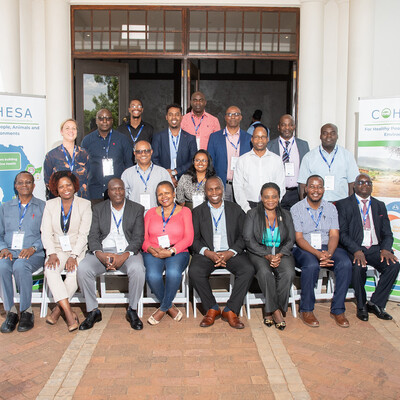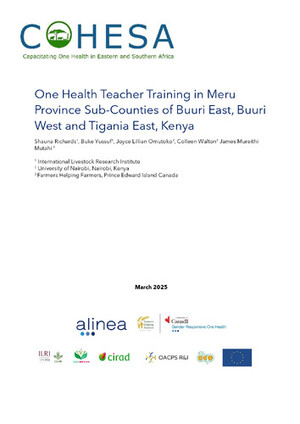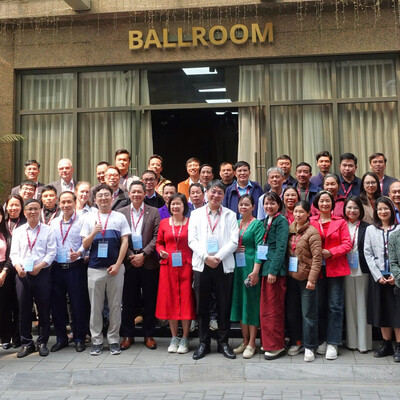
Training local champions to fight zoonotic threats and antibiotic misuse through One Health in Malawi
ILRI News
Posted on
Contributors
Across the world, rabies kills nearly 59,000 people every year; about one person every nine minutes. Most of these deaths occur in the Global South and nearly half of those who die are children under 15 years of age. In Malawi, the disease claims around 500 lives annually, many in rural districts. But through a One Health training spearheaded by the International Livestock Research Institute (ILRI), local leaders in the country—from village heads to veterinary aides—are being equipped to prevent such losses.
As in many parts of the world, in Malawi, zoonotic diseases like rabies—those that are spread from animals to humans—present a continual risk, especially among rural communities where 84% of the population depends heavily on livestock. Rabies and cysticercosis remain endemic in several districts.
At the same time, antimicrobial resistance (AMR), driven by unregulated access to antibiotics in both human and veterinary medicine, is on the rise. Over 60% of rural households in Malawi use antibiotics without professional guidance. These threats amplify public health risks, yet awareness and understanding of the problem remains low.
A collaborative response
To enable community leaders to recognize, report and address risks associated with zoonotic diseases and AMR in Malawi, two ILRI projects held a three-day training of trainers on 2–4 December 2024 at the the Lilongwe University of Agriculture and Natural Resources (LUANAR), Bunda campus. The One Health Research, Education and Outreach Centre (OHRECA) and Capacitating One Health in Eastern and Southern Africa (COHESA) conducted the training in collaboration with LUANAR.
‘We’re not here to lecture you; we’re here to work alongside you,’ Agnes Mwangwela, LUANAR deputy vice chancellor, said at the beginning of the forum. ‘By working together, we can stop rabies-related tragedies from reccuring.’
In addition to rabies and AMR, the training sessions addressed health risks such as cysticercosis, an infections of humans and pigs, using the One Health approach. Acknowledging the interrelation of human, animal and environmental health, this approach is dependent on collaboration between various sectors in addressing diseases and well-being.
During the three-day program, community leaders, animal health workers, health surveillance assistants and disease surveillance volunteers—the first responders to health emergencies in rural areas—learned how to identify, report and mitigate zoonotic diseases such as rabies. They also aquired essential understanding of AMR, which is a growing global threat.
‘It was enlightening to learn about the life cycle of the pork tapeworm and its impact on human health. Now, I can assist my community in stopping the spread of tapeworms,’ said Vincent Chirwa, a disease control surveillance assistant from Mitundu, Lilongwe District.
Converting knowledge into action
After the training, the newly equipped trainers held community sessions in Mkwinda (6 December) and Mitundu (7 December) areas of Lilongwe District and Salima District on 9 December 2024. During these sessions, they educated local farmers, religious leaders, teachers and other community leaders on vaccination, proper livestock management and disease surveillance.

Esther Chamanza teaches the community in Mkwinda, Lilongwe District, about the life cycle of the pork tapeworm (photo credit: ILRI/Geoffrey Njenga).
‘We don't just teach facts; this training is about enabling people to take responsibility for their own health and the health of their livestock,’ said Esther Chamanza, a health surveillance assistant in Mkwinda, Lilongwe District.
Nicholas Ngwili, a scientist at ILRI, concurred: ‘These trainings have created a space for community members to discuss issues that directly affect their daily lives —like managing stray dogs, reporting animal bites, using antibiotics responsibly and improving hygiene in pig farming.’
Peter James Mseo, assistant veterinary officer from the Ministry of Agriculture, based in Chinguluwe, Salima District, added: ‘Before this training, many in my community thought antibiotics were cure-alls. Now, I understand how misuse drives resistance. I’m ready to guide farmers on when and how to use antibiotics properly.’
Building a healthier future together
This grassroots approach underscores the belief that the future of global health is influenced by communities that are empowered to manage their own health.
Paul Fatchi, the head of the extension department and coordinator of LUANAR’s impact zone initiative, highlighted the initiative’s wider importance: ‘This training aligns with our goal of driving long-term change in rural Malawi. The impact zone initiative focuses on fostering sustainable development in communities surrounding LUANAR, using research, training and outreach to build local capacity. By equipping local leaders as health ambassadors, we’re not only improving awareness, we’re building systems of trust and knowledge that will outlast the project itself.’
Through collective action and community leadership, villages across Malawi are proving that change is possible. With support from OHRECA, COHESA and LUANAR, communities are becoming more resilient; better prepared to prevent disease, use antibiotics responsibly and protect the health of both people and animals.
This work is funded by the German Federal Ministry of Economic Cooperation and Development (BMZ) through OHRECA and Organization of African, Carribean and Pacific States (OACPS) with financial support from the European Union through COHESA.
You may also like

ILRI News
From animals to environment: How livestock antibiotic use drives human health risks beyond the farm

ILRI News
Institutionalizing One Health in Eastern and Southern Africa with evidence from regional case studies
Related Publications

Advancing green recovery: Integrating one health in sustainable wildlife management in the Asia-Pacific Indigenous People and Local Communities
- Sangkachai, N.
- Wiratsudakul, A.
- Grace, Delia
- Whittaker, M.
- George, A.
- Nielsen, M.R.
- Hogarth, N.
- Pfeiffer, D.U.
- Smith-Hall, C.
- Nameer, P.O.
- Hassan, L.
- Talukdar, G.
- Lee, T.M.
- Mathur, V.B.
- Rwego, I.B.
- Compton, J.
- Mispiratceguy, M.
- Shi, J.
- Fine, A.E.
- Animon, I.
- Carvalho, K.R. de
- Taber, A.
- Newman, S.
- Thongdee, M.
- Sariya, L.
- Tangsudjai, S.
- Korkijthamkul, W.
- Sakcamduang, W.
- Suwanpakdee, S.

Operationalizing regional One Health initiatives in Southeast Asia: Ways forward
- Lam, Steven
- Sinh Dang-Xuan
- Unger, Fred
- Meeyam, T.
- Phuc Pham-Duc
- Wacharapluesadee, S.
- Hung Nguyen-Viet

Insights and future directions: Applying the One Health approach in international agricultural research for development to address food systems challenges
- Hung Nguyen-Viet
- Lam, Steven
- Alonso, Silvia
- Unger, Fred
- Moodley, Arshnee
- Bett, Bernard K.
- Fèvre, Eric M.
- Knight-Jones, Theodore J.D.
- Mor, Siobhan M.
- Ha Thi Thanh Nguyen
- Grace, Delia

One Health teacher training in Meru Province sub-counties of Buuri East, Buuri West and Tigania East, Kenya
- Richards, Shauna
- Yussuf, Buke
- Omutoko, J.L.
- Walton, C.
- Mutahi, J.M.

National serosurvey and risk mapping reveal widespread distribution of Coxiella burnetii in Kenya
- Wambua, Lillian
- Bett, Bernard K.
- Abkallo, Hussein M.
- Muturi, Mathew
- Nthiwa, D.
- Nyamota, Richard
- Kiprono, Enock
- Kirwa, Lynn
- Gakuya, F.
- Bartlow, A.W.
- Middlebrook, E.A.
- Fair, J.
- Njenga, K.
- Gachohi, J.
- Mwatondo, Athman
- Akoko, James M.













